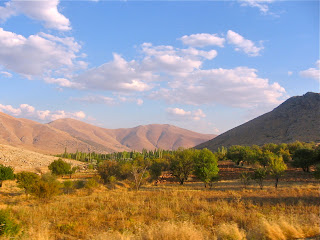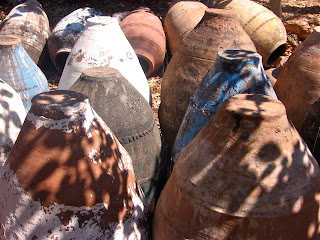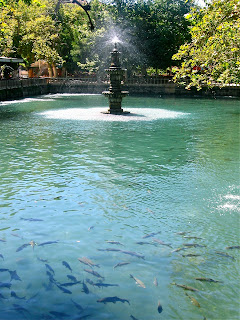On Shopping
It's hotter but less humid here than in Taiwan. The sun beats down more fiercely but you don't sweat nearly as much. You'd expect, with the harsh sun pummeling the streets that they'd have a shopping culture more akin to Taiwan's, where everyone does their browsing in night markets: where old ladies get up at dawn to buy vegetables (and demand free green onions), where you might shop in a department store by day but street shopping culture really doesn't happen until the sun sets.
But it's not - we walked to the bazaar area of Gaziantep at about 8pm yesterday, just as the outside weather was becoming bearable, if not pleasant, and the whole thing was shut down...just as prime shopping time would be starting in Taiwan. We returned today in the blaze of the post-breakfast sun and it was buzzing.
On Restaurant Culture
It's fairly common in Taiwan to get a menu and be asked within thirty seconds what you want (or some similarly short period of time), and then the food comes quickly. It's not taken away until you are very clearly done and your plate is preferably clean, and the restaurant will offer to pack up as small an amount as two dumplings or five forkfuls of fried rice. Restaurants close at around 2pm and re-open for dinner - if you don't eat at normal mealtimes this can be very irritating indeed (and we don't eat at normal mealtimes, so we eat more 7-11 food than we'd like because everything's closed when we do eat). You pay a small amount for extra
xiaochi - little plates not unlike tapas or appetizers, often vegetable or tofu based.
In Turkey, you might not even get a menu - the waiter will appear and ask what you want and only when you look at him questioningly might a menu appear (read: might). The food comes quickly, usually, but sometimes it has to be prepared: we once waited 15 minutes for a kunefe (white cheese covered in vermicelli, cooked and doused in sugar syrup). You get a bunch of free stuff with the meal, usually salad and bread, possibly tea depending on the restaurant or if the owner likes you. We've also gotten free bulgur patties with tomato paste and a chicken stock flavor, free melon, free bottled water...if it appears and you did not ask for it, you can assume it's included. You are not expected to finish your meal: it's perfectly normal to push your plate away and have the waiter take it with plenty of bread and salad still there. With drinks, your glass might be taken away even if you have a centimeter of liquid left to drink.
The best part? Restaurants tend to stay open all day, and are even busy. You can eat when you want, even if that time is 2 or 3pm. We wandered into Imam Cagdas, a pretty famous joint, at 1:30pm expecting to hit the tail end of lunch, but instead business picked up straight through 3pm when we left and was hopping when we paid the check.
Women do not dine out as often though - other than in large, famous restaurants I find I am often the only woman in the restaurant (but they're still happy to cater to me). Not in Istanbul of course, but definitely in Gaziantep.
On Food
Oh, how I have missed baklava, pistachios, cheese, olives, yoghurt, good kebab and good bread! I love Taiwanese food and the various cuisines of East Asia in general, but really sometimes I need a good infusion of olives and yoghurt.
I have to say, though, the food. It is
so good. It's like Singapore, or a particularly good night market like Keelung: it doesn't matter where you eat - everything is good. You have to try really hard to get a bad meal in Turkey. Even the oily bain-marie
porsyon dishes we had in a bus station were good. I am not normally into chicken - I prefer lamb, pork or duck - but I just ate the most amazing chicken shish kebab, I can't even tell you how good it was. Earlier today I had
ezme - a spicy finely-chopped salad of hot red peppers, cucumber, tomato and parsley topped with pomegranate molasses and olive oil, and I practically creamed myself it was so good.
On Nostalgia
Being Armenian from Turkey, or rather being of an ancestry that is Armenian from Turkey, it surprises me how many cultural "things" here remind me of that side of my family: expressions on women's faces that bring flashbacks to my Nana (great grandmother, who died in the early '90s) who had similar mannerisms and facial tics, bits and pieces of language that call to mind the Armenian polyglot that my older relatives used to speak to each other (it was Armenian, and this is Turkish, but the particular strain of Hatay Armenian they spoke was heavily influenced by Turkish). The hand-crocheted white doilies, the lahmacun and plates full of lemon, onion, tomato, cucumber and parsley, food serving vessels for sale in markets that look like the decorative serving dishes my family owns, the carpets that remind me of our carpets, the Turkish coffee cups that look like my mom's heirloom Turkish coffee cups, and so many other things that remind me of home and, although I can't explain it, make me feel like "yeah, I KNOW that".
As a kid it didn't occur to me that all the idiosyncracies and weirdnesses of my family, mostly food-related ("why do we have eight types of olives? All my friends just eat two - the black kind from a can and the green kind from a jar. Why are our olives all wrinkly, or too big, or purple?" Why do we eat hummus on Thanksgiving? Nobody else does that." "Why does my family eat pilaf when everyone else just makes pasta or rice? My friends don't even know what pilaf is") were actually cultural tidbits that survived the diaspora and generations that followed.
On Women's Freedom
In Taiwan I feel basically free to go just about anywhere, barring a few local gangster bars in which foreigners, let alone women, are not welcome. Here, we pass several tea salons per day full of men: I know that if we sat there and asked for tea that we'd be served, but I also know that I'd get
Looked At Disapprovingly because women just don't drink tea in tea gardens. They socialize at home or just outside in doorways whereas men get chairs, tea and backgammon. I feel welcome in all restaurants but am often the only woman. So far going without a headscarf and wearing short sleeves has been fine, but tomorrow we head to Sanliurfa and I've been warned that I should really cover my arms and hair. I do feel it's restrictive - in terms of clothing more so than Bangladesh. In terms of going out, it's about the same (not in Istanbul or Goreme, but definitely in Gaziantep and, so I hear, Sanliurfa).
I do feel that I get more respect as a part of an obviously married couple, but at the same time I feel more invisible for it.
On Religion
It's odd, trying to compare secularized Islam in Turkey with the sort of "it's all good" approach to folk religion in Taiwan, but I do feel there are similarities. The religious practices are there, such as observing Ramazan (Ramadan) or headscarves and modest clothing for women, or not drinking, or praying when necessary...but plenty of people don't follow them. We've seen a lot of women even in Gaziantep in shirt sleeves with their hair uncovered, have eaten during the day around locals who were also eating despite the fact that it is Ramazan, and heard calls to prayer that nobody around us heeded. At the same time, the restaurants do fill up when it's time for
iftar (breaking the daily fast), the news broadcasts the rolling westward of cities in which it is now time for
iftar, and business hours do reflect it in some ways.
I feel similarly in Taiwan - the temples, fortune blocks, rituals and other assorted religious hoopla is there if you want it, but there is no great pressure to avail yourself of any of it (except possibly from your mother-in-law) unless you want to.
On Linguistic Incompetence and Being Mistaken for a Local
These two are related. In Taiwan, I am very obviously a foreigner, and yet high-functioning in the language. I still run into language snafus, but generally speaking I'm day-to-day fluent in Chinese now, and can slip into it without thinking (even if I make mistakes). This surprises people, because I don't look local and don't look as though I should speak Chinese so readily.
In Turkey, I've been mistaken several times for a local (usually when I have a headscarf on). This is odd to me, because I don't look even remotely Turkish or Armenian: I got the Polish genes from my dad's side. I was not surprised when nobody looked twice at me in Prague, but here I don't feel like I could pass for a local, but hey, apparently I can.
And yet I don't speak Turkish. The same surprise that crosses the faces of many Taiwanese when they realize I can speak Chinese crosses the Turks when they realize I don't speak Turkish at all, aside from a few basic words I've been learning as we travel. Here I look like I should be able to converse, but I can't - and it's frustrating and a bit of a shock, albeit an expected one.
It's been awhile since I've been in a country where I could pass for a local but don't speak the language - the last time was really Prague, but enough people in Prague speak English that it wasn't really an issue.
I'm also so used to being able to be in a foreign country (if I could still call Taiwan foreign - I'm not sure I can) and communicate easily that it's frustrating that now, I can't. We stuck to touristy places in Egypt due to time constraints, Indonesian was easy enough to deal with (super simple grammar) that it wasn't a problem, English is widely spoken in India and the Philippines, and in Japan we always spend time with our friends who speak Japanese. In Central America we could get by with our high school Spanish.
I have more to write about but will save that for a second post...



































































